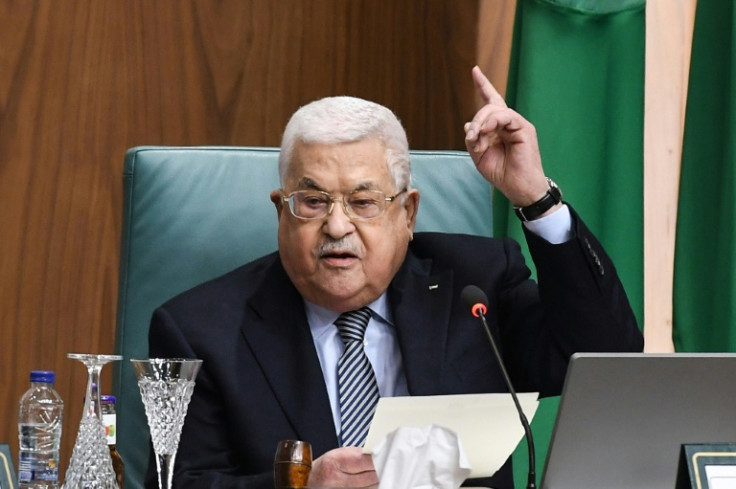
In Palestinian cities in the occupied West Bank, long the turf of president Mahmud Abbas's Fatah party, the green flag of Islamist rival Hamas is flying ever higher thanks to prisoner-hostage exchanges.
For three nights, Palestinians have celebrated the return of dozens of detainees freed from Israeli jails, in exchange for women and children seized during October 7 attacks by Hamas fighters.
That has seen the popularity of Hamas soar in the West Bank, run by Abbas's Ramallah-based Palestinian Authority (PA).
Ahmed Abdelaziz, 63, joined the celebrations on Sunday.
"I'm here in solidarity, and because I appreciate what Hamas has done. Seeing these young people get out of prison thanks to the resistance, I'm overjoyed," he said.
"The joy of the prisoners' families, the mobilisation of the people, all that is pushing me towards supporting Hamas."
Israel released 117 Palestinian prisoners during the first three days of a four-day Gaza truce deal.
Hamas freed 39 hostages under the agreement, plus 19 foreign nationals in additional releases, out of the roughly 240 people it snatched during the deadliest attack in Israel's history.
The cross-border raids left 1,200 people dead, mostly civilians, according to Israeli officials.
In response, Israel vowed to destroy Hamas, launching air strikes and a ground offensive into Gaza that the Hamas government says have killed nearly 15,000 people, mostly civilians and including thousands of children.
In Ramallah, freed prisoners carried on the shoulders of their supporters and draped in the Hamas flag said they prayed for "God to give strength to the resistance" -- referring to Hamas and the other armed groups in Gaza.
"They say Hamas are terrorists, but we are all Hamas," shouted the crowd.
In Al Bireh, a Ramallah suburb where the elected Hamas mayor was detained by Israel at the start of the war, a few yellow Fatah flags can be seen.
But for marcher Tareq al-Omla, Hamas -- listed as a terrorist organisation by the United States, Israel and the European Union -- has more legitimacy than Fatah.
The group was acting on "behalf of the Palestinian people who are attacked every day by Israeli soldiers and settlers", he said.
Asked about the violence against civilians at Israeli kibbutzim and a rave during the Hamas attacks, demonstrator Jihad Ayuch told AFP: "The story started before that, and the real question is what Israel has been doing to the Palestinians before October 7."
Observers expect the crowds marching in the West Bank to swell in coming weeks.
Hamas still holds around 200 hostages, among them soldiers who are excluded from the exchange agreement, and will want to use them to secure the release of all or some of the more than 7,000 Palestinian prisoners still detained in Israel, many of them far more prominent than the youngsters and women freed so far.
The agreement in force since Friday effectively only concerns women prisoners and those under 19 years of age, almost all of whom are unknown to the wider public.
In 2011, more than 1,000 Palestinians were exchanged for Israeli soldier Gilad Shalit, who had been taken prisoner by Hamas five years earlier.
Among those released was Yahya Sinwar, Hamas's leader in Gaza, who is suspected of masterminding the October 7 massacre and is now being lauded in the West Bank.
"The prisoners are what have always united all Palestinians," said Qaddura Fares, head of the PA's commission for prisoners.
The PA has itself been largely silent on the subject of the releases and, like the image of its president Abbas, conspicuously absent from the recent celebrations.
It is a political choice, according to one of its officials, who spoke on condition of anonymity.
"The Authority doesn't want to be associated with what Hamas is doing."
Political commentator Jihad Harb said the West Bank crowds "want to stand up to the Israeli authorities, who don't want any celebrations or shows of support for the Palestinian resistance".
If even more releases follow after the current agreement, he predicted, "the popularity of Hamas will double".
No election has been held in either the Gaza Strip or the West Bank since 2006, and support for rival parties can only be measured in the street.
The last vote was won by Hamas in both parts of the Palestinian territories and was followed by factional fighting that saw them split -- Hamas in power in Gaza, and secular Fatah running the West Bank.
Years of political stagnation have followed, while Israeli settlements and army raids have expanded in the West Bank.
Israel has normalised ties with some Arab states whose governments are deprioritising the Palestinian issue.
Hamas has put it back on the international agenda, though at a high human cost.
"We Palestinians were all waiting for this day," said Um Muhammad, mother of freed Palestinian prisoner Noorhan Awad.
"We thank the resistance who made an effort so they get released thanks to the blood of the martyrs."








